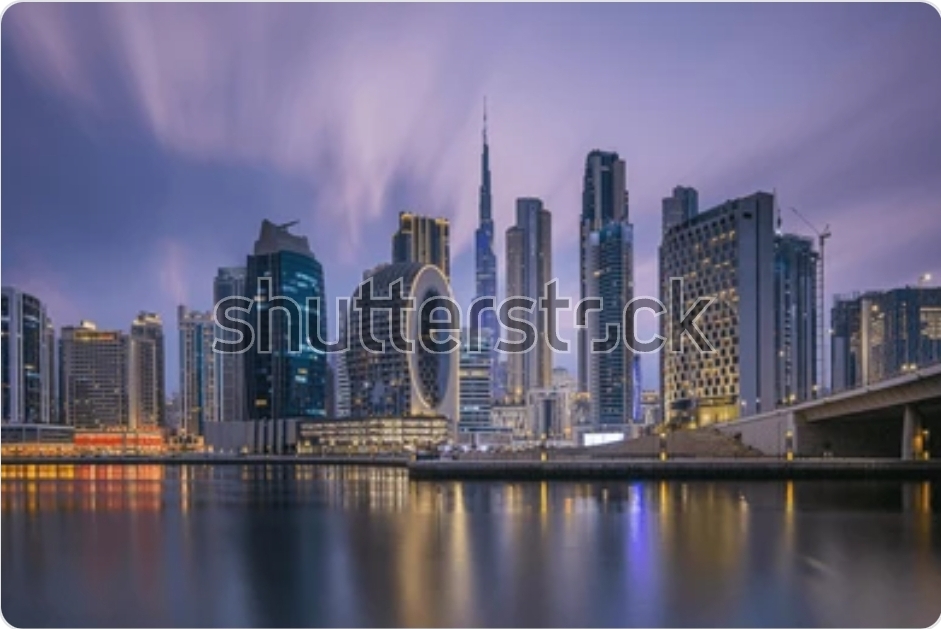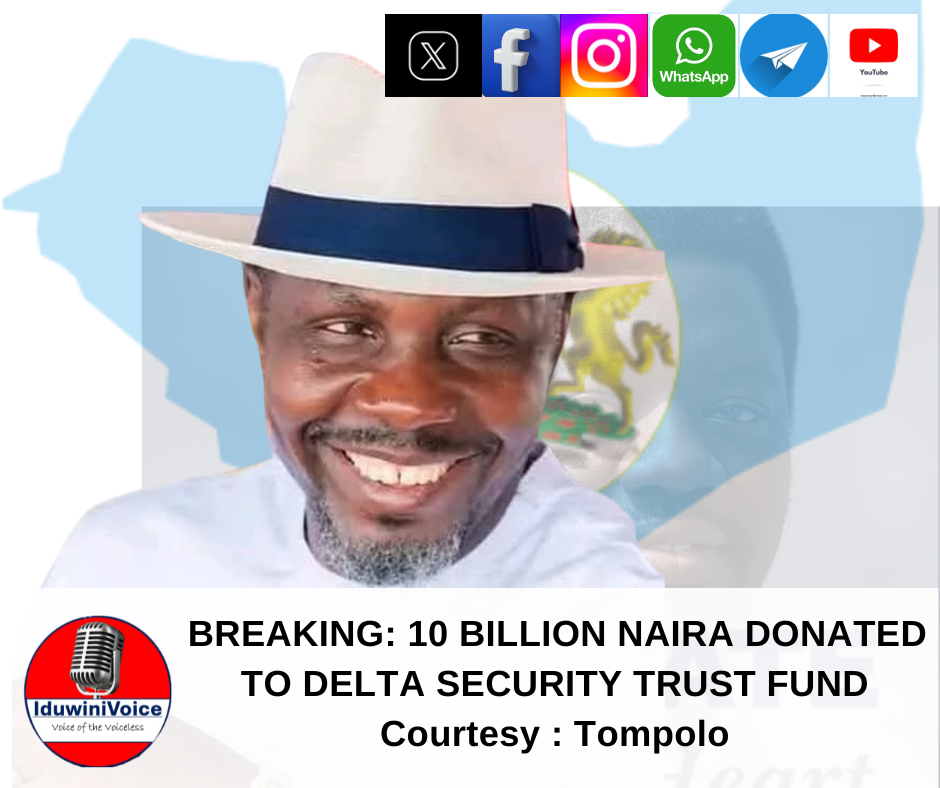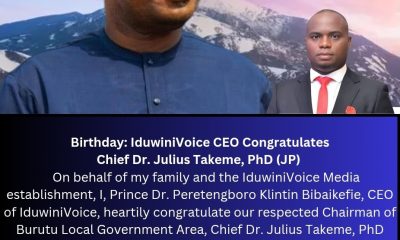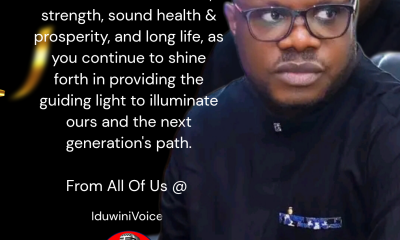Editorial
THE DIGITAL TIDE AND THE UPSURGE OF AVANT-GARDE JOURNALISM: THE MODEL OF IDUWIINIVOICE

Being a Text of Keynote Address by Prof. Binebai at the March 29, IduwiniVoice Launching
Welcome seekers of truth and champions of justice. Today we gather on this sacred journalism ground where the majestic waters of Iduwini converge with the whispers of our ancestors, in the bold spirit of our gods of truth, justice, thunder and fire in the majestic presence of King Bosu Dio, the Ebenanaowei of Iduwini Delta, to inspire our quest for storytelling. Thus, it is with great pleasure and a deep sense of responsibility I stand here to deliver a lecture on the digital tide and the upsurge of Avant-garde journalism with focus on Iduwini voice, a distinctive news media that expresses itself formidably and elegantly as a newspaper and television in the cyberspace. By nomenclature, it is a communal news tabloid that was established by Perez Klintin Bibaikefie, An Engineer, A mathematician, a public affairs analyst, an entrepreneur, a politician and a rising star journalist from Odimodi in Iduwini Kingdom. The idea of an Iduwini newspaper was mooted as far back as 2006. In 2021 Iduwini voice was adopted as a media organisations and by July, 2023 it was registered. Iduwini Voice came to join a league of avant-garde newspapers such as Gbaramatu Voice, The Liberator Newspaper before the recent emergence of Arogbo -IbeVoice, Congress Newspaper and others as kingdom news voices.
Journalism and the Ijaw nation.
Ijaw nation has experienced journalist in many faces of its manifestation and practice. Thus in this sacred space, let us remember the legacy of Ernest Ikoli, the father of Nigerian journalism who stood distinct as a first generation Ijaw Journalist and politician, who challenged the excesses of colonialism. May his promethean spirit infuse our words with power and our hearts with courage and light. The second wave of Ijaw journalism produced other veterans like Willy Bozimor, Owei Lakemfa, Charles Tambou, Barclays Ayakoroma, Simon Ambakederemo, Steve Waidor- Pregbagba, Patrick Brisibe, and Murphy Ganagana. These journalists were employed by mainstream Nigerian newspaper. They wrote for newspapers owned by none Ijaws. They did not have the privilege and opportunity to write freely on Ijaw issues. The Third wave of journalism in Ijaw land came with the introduction of indigenous newspapers in cold print. Their vision is to tell the Ijaw story from the Ijaw point of view. They are Presidor Ghomorai who founded Ijaw News, the first Ijaw Newspaper to be established in the early 90s. Followed by Alfred Egbegi’s Izon Link. Then came Oyadonghan’s Banner News, The Light jointly founded by Ebi Any Ozegbe and Ben Binebai, Creek News, Crystal Express, Dialogue, the National Reflector, Izon Apia, The Agenda, and a host of others. The proliferation of these newspapers in Ijaw land across the Niger Delta was propelled by the creation of Bayelsa state.
It is significant to note that the emergence of the digital tide gave rise to the fourth wave of journalism in Ijawland, and this has greatly transmuted the landscape of journalism in Nigeria, particularly in the Niger delta. It is an era of journalism creativity meets with activism, where courage challenges tyranny and oppression, where tales of freedom and resistance are woven against injustices, where subalternised voices are made loud. President Olusegun Obasanjo played a key role in introducing the Global System for Mobile Communication, GSM technology to the country. His government laid the groundwork for the launch of GSM services in 2001. This was a bold attempt to revolutionize telecommunication in Nigeria. In 1995 internet services were introduced earlier in Nigeria and early online platforms emerged, particularly email and basic websites. In 1999 This Day, a Nigerian newspaper launched its online edition. This was followed by the guardian. In 2005 blogging gained popularity and in 2007, social media platforms like Facebook and twitter gained traction in Nigeria. In 2012, Nigerian government gave legitimacy to blogs and social media as news sources. Historically, this era produced an avalanche of digital newspapers. Apart from the android Cellphones, powering citizen journalism, Advocacy Journalism, Guerrilla Journalism. Digital technology gave prominence to the emergence of avant-garde journalism in the creeks of the Niger Delta. Avant-garde journalism powered fresh variants of storytelling and challenging media journalistic norms of orthodoxy, characterized by its emphasis on innovation, experimentation, and creative risk-taking. This methodology has led to the development of new narrative forms, such as interactive and immersive storytelling. This brand of journalism amounts to an intersection of technology and journalism which explores the potential of digital tools to enhance storytelling and audience engagement.
The emergence of Avant-garde journalism particularly from the Ijaw area of the Niger Delta is a very formidable solution to the major problems of the Ijaw nation. Such as lack of voice and speakability. Before Avant-garde journalism Ijaw nation suffered voicing and adequate representation. The orthodox media operatives had the blank check to write anything they wished for the Ijaw nation. Avant-garde journalism from the Ijaw soil serve as counter narrative voices that present the authentic story of the Ijaw people. These news agencies from the riverine offer distinct viewpoints and insights shaped by their proximity to the local environment and its cultural significance. They possess intimate knowledge of marginalized environment, its dynamics, and the community, enabling in-depth reporting.
Characteristics Avant-garde of journalism
Avant-garde journalism from the Riverine effortlessly access remote areas and gather stories that might or may have been disregarded by mainstream media. They enjoy the trust of the local community, facilitating interviews and information gathering. They duel in their riverine environment consequently, they strongly capture and underscore environmental issues, such as pollution, conservation, environmental sustainability, eco-friendly practices, renewable energy transition, carbon neutrality, climate resilience, biodiversity preservation, waste reduction management, sustainable development, green infrastructure and environmental stewardship in the Ijaw areas and the Niger Delta. Avant-garde brand of journalism is community-centric because it focuses on the needs, concerns, and stories of the local community. It is hyper local because it covers news and issues specific to the riverine area. Most importantly, the alternate journalism in question amplifies the voices and perspectives of ordinary people, not just elites or officials. Significantly, it seeks to inspire community-led solutions and initiatives. By their nature, they celebrate the resilience and adaptability of riverine communities in the face of challenges. Avant-garde journalism is essential for democratic engagement, community empowerment, and sustainable development in these unique regions.
Why Avant-garde journalism
Many reasons have been observed as responsible for the emergence of Avant-garde journalism. These include dissatisfaction with mainstream media that prioritizes sensationalism and profit over truth and depth, leading to a desire for alternative forms of journalism. There is also the point of technological advancements occasioned by the rise of digital media and social platforms. These developments have greatly powered democratized journalism which gives opportunity for new voices and innovative storytelling methods. Interestingly Readers increasingly seek in-depth and diverse perspectives that challenge traditional narratives. And there is the need for independent and unbiased reporting. Avant-garde journalism often pushes boundaries in form and style, attracting journalists seeking innovative ways to tell stories. Essentially as a media tradition growing from the subaltern soil, it focus on marginalized voices. It gives prominence to enlarging diminished voices and perceptions, thus, promoting diversity and inclusion. They are cost effective to operate.
Avant-garde journalism in Ijaw land: functions
The function of these new forms of journalism growing from the neglected and oppressed soil of the Ijaw nation are numerous: They share stories and traditions, and help preserve the cultural heritage of riverine communities. They are very active news agents and sonorous voices of grassroots reporting by providing ground-level reporting, though capturing of the voices and experiences of ordinary people. Besides they cater for the Ijaw and specific audience interested in river-related issues thus creating a dedicated readership. By leveraging these advantages, the Ijaw avant-garde or alternative journalism and journalists produce distinctive, impactful, and high-quality reporting that rings with their audience.
These media outfits collectively constitute the avant-garde journalistic tradition in the 21st century. They are one of the very vibrant voices and agencies that have come to change the direction of journalism in this age of digitalisation and technology. The avant-garde tradition of journalism embraced roundly and resoundingly by rising Ijaw journalistic voices are the embodiment of the digital tide that changes media landscape and the rise of digital journalism.
Iduwini Voice, a Paradigm of Avant-garde Journalism
In the ever-shifting landscape of contemporary journalism, a new wave of innovation and creativity is redefining the way we tell stories and engage with the world around us. At the forefront of this revolution is IduwiniVoice, a pioneering platform that embodies the spirit of avant-garde journalism. With its fearless approach to storytelling, Iduwinivoice is harnessing the power of digital media to push boundaries, challenge conventions, and redefine the norms of journalism. Together with Gbaramatu voice is the first known online and hardcopy media newspaper to emerge in the littoral regions of Delta state, followed by the Liberator Newspaper, Congress newspaper, Arogbo Ibevoice, Egbema voice, they not only provide digital storytelling by sharing stories, cultures, and histories of their environment through digital platforms. They also preserve the Ijaw heritage and accommodate virtual tourism through the promotion of riverine tourism and supporting local economies. They offer informal education and create awareness and campaigns about riverine environmental issues and promote education.
This lecture “The Digital Tide,” explores the remarkable journey of Iduwinivoice and its impact on the media world. It is a bipartite media organization. Founded and popularized by Perez Klintin Bibaikefie. Iduwini voice delves into the vision, of creativity and innovation that have made it a beacon of avant-garde storytelling. From the intersection of technology and journalism to the evolving role of the media in shaping our understanding of the world. Iduwinivoice’s model of avant-garde journalism has been particularly influential, with its focus on digital innovation and community engagement. Iduwini Voice brings stories from the grassroots, amplifying the voices of marginalized communities. It provides an alternative to mainstream media narratives, which often marginalize or sensationalize minority communities. It helps to preserve the cultural heritage and traditions of the Niger Delta region. And conducts in-depth investigations into issues like corruption, human rights abuses, and environmental degradation. Iduwini voice provides a platform for women, youth, and other marginalized groups to share their stories and perspectives. By leveraging digital platforms, Iduwini Voice democratizes access to information and journalism, reaching a global audience. Iduwini Voice’s significance extends beyond the Niger Delta, offering a model for grassroots, community-driven journalism that can be replicated globally. Because it is a local media outfit executing journalistic activism on the streams of globalization, it is difficult to brand it as a territorial newspaper. By nomenclature it is territorial, by medium it has global capacity it is can be local, national and global depending on its contents.
Iduwini voice is a prototypal model of the avant-garde and digital technology revolution holding sway across the length and breadth of Ijaw land. It has established a bulky voicing tradition in which it dominates the social media space with voices of denunciation, commendation and recommendations of actions and inactions by the powers that be. Iduwini voice flying in the rising digital wind and wings, has dutifully emerged on the horizon of the Niger Delta to participate constructively in shaping opinions and mounting pressure on contrary political centers of gravity. And the man behind this bipartite newspaper, Perez Klintin Bibaikefie, deserves to be commended. It has the noble tradition of balancing lopsided journalism and taming the tiger. Iduwini voice and its counterparts play a crucial role in holding power accountable and promote social justice. Together, they fly the banner of radical journalism by taking critical positions, undergo investigative reporting to expose injustice, corruption and systemic issues, they are champions of alternative viewpoints and the command activists approach and advocacy.
Distinguished ladies and gentlemen, Iduwini voice is one of the most circulated, widely circulated and constantly circulated newspaper with quality contents. It is a leading voice of the voices in online journalism. Today, I have established Iduwini voice as an avant-garde newspaper with transformative energy, a vibrant riverine journalistic voice that is strongly redefining the landscape of news reporting as it affects his homestead by being counter-narrative and embracing innovations. I tell you in strong terms, it is an embodiment of the spirit of avant-garde journalism, a radical reordering of journalism to push boundaries and reshaping the possibilities of storytelling. It is bound to inspire a fresh generation of journalists, activists and community leaders.
Today marks a significant milestone with the official launch of IduwiniVoice. Thus on behalf, the man who bows before the sun that melts his hubris into fashionable humility, a man with an inner voyage of studied character, the Environmental Rights activist, A Philanthropist of great repute, a sport enthusiast, an Ijaw nationalist, the Chairman of this august gathering, High Chief Comrade Sheriff Mudale DG. CEPEJ, I am honoured to present to you a multifaceted and talented young man, a rising wordsmith, a cultural Ambassador, a formidable champion of avant-garde journalism, a digital narrator and investigator, an innovative story teller, a visionary thinker, a man whose pen is more valuable than the warriors sword, a passionate advocate, a determined journalist charged with great purpose, dominated by an impregnable will to climb to the mountain top of journalism; a young man, who commands an imagistic power that defines the power of technology and avant-garde journalism, Perez Klinton Bibaikefie.
Distinguished ladies and gentlemen, Victoria Brickson once said and I quote “place your hands into soil to feel grounded. Wade in water to feel emotionally healed. Fill your lungs with fresh air to feel mentally clear. Raise your face to the heat of the sun and connect with that fire to feel your own immense power” Perez Klinton Bibaikefie is a symbolism of this quote. I congratulate him and his workforce on this remarkable achievement.
Editorial
Is Dubai A Country? Inside the Seven Kingdoms of the United Arab Emirates

By: Editorial Team
The United Arab Emirates (UAE), often hailed as a beacon of modern development in the Middle East, is a federation of seven emirates—each with its own distinct history, ruler, and cultural identity. Since its unification in 1971, the UAE has stood as a rare example of how traditional monarchies can collaborate to build a stable and globally respected nation.
At the heart of the federation lies Abu Dhabi, the capital and largest emirate, known for its vast oil wealth and political influence. The Al Nahyan family, which leads Abu Dhabi, has played a central role in shaping the UAE’s national vision and foreign policy. The current President of the UAE traditionally comes from this emirate, underscoring its leadership within the union.
Dubai, the shining star of the federation, represents ambition and innovation. Under the leadership of the Al Maktoum family, Dubai has transformed from a desert outpost into a global hub for finance, tourism, and technology. Its breathtaking skyline, led by the Burj Khalifa, has become a symbol of Arab progress and resilience.
Moving beyond the two powerhouses, Sharjah distinguishes itself as the cultural and educational capital of the UAE. Led by the Al Qasimi family, it has preserved the emirates’ artistic heritage while promoting academic excellence through its numerous universities and museums.
The smaller emirates-Ajman, Umm Al-Quwain, Ras Al Khaimah, and Fujairah-each add unique character and strength to the federation. Ajman, the smallest, thrives on trade and manufacturing; Umm Al-Quwain offers a peaceful charm along its quiet shores; Ras Al Khaimah, nestled against the Hajar Mountains, is known for its natural beauty and growing industrial base; and Fujairah, facing the Gulf of Oman, plays a strategic maritime role in the region’s economy.
Despite their differences in size and resources, the seven emirates remain bound by shared values, mutual respect, and visionary leadership.Their collective success story reflects not only unity but also the ability to balance tradition with progress.
Over five decades after its founding, the UAE continues to prove that cooperation among monarchies can yield a modern, forward-looking state-one that honors its past while boldly stepping into the future. The federation’s model of governance offers an enduring lesson in leadership, stability, and nation-building in a region often defined by division.
Photo Credit: shuterstock
Editorial
The Modern Avatar of Agadagba

Editorial – IduwiniVoice
Government Oweizide Ekemupolo is 4th Century descendant of The progenitors of the Oru tribe, the archetypal Ijaws, who settled in the central Niger Delta and over time, who developed and spread to the entire Niger Delta. He his an embodiment of the ancient and modern ways and forces of the ijaw ancestral greats, ruled my ancient spiritual and human laws, a man and a superman.
Prior to 1600 AD, the Ijaws first and formally formed city-states on their island of abode in Central Niger Delta. The city-states were named Agadagba-bou, Isomou-bou, and Opugla-bou. The popular city-state was called Agadagba-bou, which, according to history, flourished for 400 years until it got abandoned in 1050 CE. That was the period Ijaw people migrated within the central Niger Delta and spread to the Western and Eastern Niger Delta.
Agadagba-bou, Isomou-bou, and Upugla-bou, which represented the Ijaw civilization at the historical island, long before it was named Wilberforce Island, had cultural, spiritual, linguistic, and occupational homogeneity.
They were all worshippers and believers of the sky God. The sky God that the Ijaws call today, even from ancient times, is Egbesu. It is believed that the Wilberforce Island was known as a forest named after Agadagba, the most powerful chief priest of Egbesu, who also doubled as the military general of the Izon nation.
Agadagba-bou, as a nomenclature, derives its bearing from Agadagba, the chief priest and generalissimo who once reigned on the Wilberforce Island. It is certain that the island hosted the Ijaw nation long before the time of Agadagba because Agadagba was appointed a chief priest and military general during his time by a potentate ruler of Ijaw nation.
In the primordial mists of time, Agadagba, the illustrious military general and chief priest of Egbesu, strode forth from the hallowed grounds of Agadagbabou, his footsteps echoing through the annals of Ijaw history. This revered figure, a paragon of martial prowess and spiritual wisdom, embodied the dual essence of his people, wielding the sword and the sacred staff with equal aplomb. The whispers of the ancients tell us that Agadagba’s reign predated the 1600 AD, a bygone era when the Ijaw nation thrived in harmony with the rhythms of the Niger Delta.
Agadagbabou, the cradle of Ijaw civilization, slumbers beneath the weight of centuries, its sacred soil serving as the final resting place of the ancestral spirits. Here, the venerable dead lie entombed, their ethereal essences lingering, awaiting the supplications of their descendants. Alas, the diaspora of the Ijaw people has occasioned a lamentable disconnection from these archetypal forebears, a severance that has hindered the unfettered flow of ancestral blessings, those numinous benedictions that are the birthright of every society.
For it is an immutable truth that the progress of a people is inextricably linked to the approbation of their ancestors.
The epochs have passed, and Agadagba’s terrestrial sojourn has long since drawn to a close, yet the imperishable essence of this legendary figure endures, awaiting reification in the mortal coil. Behold, 4.18 CENTURIES AFTER AGADAGBA, PRICESELY FOUR CENTURIES PLUS, in this our age, Government Oweizide Ekemupolo, a worthy scion of the Ijaw nation, has arisen, invested with the sacred mantle of Egbesu’s chief priest and military general. The symmetries are striking, the correspondences unmistakable: Ekpemupolo stands forth as the avatar of Agadagba, a reincarnation of the primordial hero, reborn to reclaim the lost patrimony of his people.
As we gaze upon Ekpemupolo, we behold the rekindled flame of Agadagba’s indomitable spirit, a fiery essence that refuses to be extinguished. The mythopoeic imagination whispers secrets in our ear, intimating that this modern-day embodiment of Ijaw valour and spirituality is, in truth, a Priest of the ancient mysteries, a hieratic vessel ordained to restore the pristine glory of Agadagbabou and reestablish the vital link between the living and the ancestral dead.
Thus, the epicycle of time turns full circle, as the reincarnated Agadagba, in the person of Ekpemupolo, strides forth to reclaim his rightful place within the sacred precincts of Ijaw tradition. The word is a witness to his spiritual and endeavours which catalyse a renaissance of the Ijaw spirit, rekindling the ancestral fires that burn bright within the collective unconscious of this venerable people, and guiding them toward a future illuminated by the radiant glow of their archetypal forebears.
As Tompolo’s efforts continue to bear fruit, Nigeria’s economic landscape is transformed, and the nation’s people reap the benefits of his tireless endeavours. His legacy will forever be etched in the annals of Nigerian history, a shining testament to the power of visionary leadership and unwavering dedication to the nation’s progress.
Benedict Binebai is a Professor of African Literature, a Social Conscientizer, and a Critic of outstanding repute.
(c) IduwiniVoice
Editorial
A Magnificent Gesture of Philanthropy: Tompolo’s Landmark Donation 10 Billion Naira to Delta State Government

Editorial
Chief Tompolo’s most generous bestowal of 10 billion naira upon the Delta State Security Fund is a magnificent affirmation of his steadfast devotion to the betterment of his beloved homeland. This munificent act not only underscores his profound solicitude for the well-being of the citizenry, but also serves as a sonorous confirmation of his dedication to the edification of the nation.
This magnificent donation bespeaks Chief Tompolo’s perspicacious vision for a Delta State wherein the territorial integrity, individual safety, and proprietary rights of its inhabitants are zealously safeguarded and protected. For it is an immutable truth that security constitutes a fundamental pillar for peaceful and progressive human existence, and a people that get security right are a people who enjoy prosperity, stability, and tranquillity. His largesse constitutes a clarion call to all right-thinking Nigerians to emulate his exemplary conduct, thereby contributing to the realisation of a more stable and prosperous nation.
As a private individual, Chief Tompolo’s remarkable munificence distinguishes him as a true architect of society, a philanthropist of discerning taste, and a stalwart champion of both private and public institutions. His actions evince a profound comprehension of the intricate nexus between security, patriotism, and nation-building, and serve as a shining exemplar for others to follow.
In the pantheon of benevolent figures, Chief Tompolo’s deed resonates with the selfless generosity of mythical beings like Prometheus, who defied the gods to bestow the gift of fire upon humanity, or Hercules, who cleansed the Augean stables to bring prosperity to the land. Like these fabled heroes, Chief Tompolo’s philanthropy emanates a profound sense of altruism, illuminating the path towards a brighter future for the people of Delta State.
By this singular act, Chief Tompolo has floated a most compelling narrative that the Ijaw nation, and indeed all ethnic groups in Nigeria, have a critical role to play in shaping the country’s destiny. His donation is a puissant statement that the resources and talents of Nigerians, regardless of their region or ethnicity, can be harnessed to forge a more united, secure, and prosperous nation, and that the Ijaw people, in particular, are committed to contributing to the construction of a brighter Nigerian picture.
Chief Tompolo’s unprecedented gesture inaugurates a new paradigm of leadership for the Ijaw nation, one that radiates an unparalleled aura of generosity, vision, and selflessness. This luminous exemplar of leadership kindles a guiding light, illuminating a path towards a more prosperous, equitable, and enlightened future for the Ijaw people, and serves as a resplendent model for leaders across Nigeria and beyond, demonstrating that true greatness is measured by the ability to uplift and empower one’s community.
Benedict Binebai is a Professor of African Literature, Public Speaker, and a renowned critic of intellectual acclaim.
(c) IduwiniVoice






